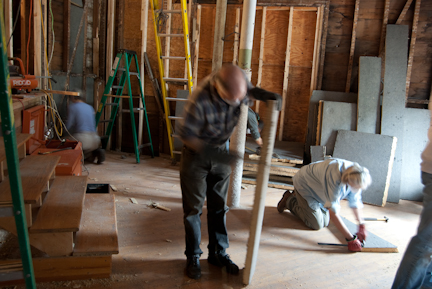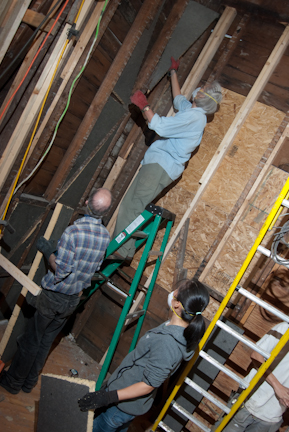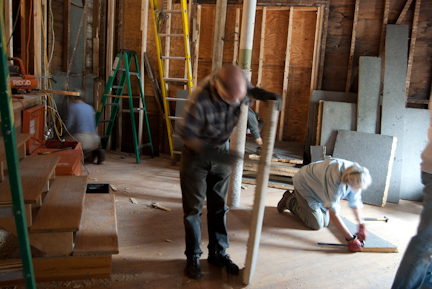 On a recent work day at the JP Green House, volunteers came out of the woodwork.Leise JonesOne of the early effects of climate change was the demise of my marriage. I was living a comfortable, middle-class life that was all wrong for my politics, and my essential devotion to simplicity. At some point in my mid-twenties I had gotten nervous, and opted for the safety of a life much like my parents’. It worked until I encountered the work of James Hansen and Bill McKibben in the late 1990s, and the part of me that longed to live and work for the truth rose up.
On a recent work day at the JP Green House, volunteers came out of the woodwork.Leise JonesOne of the early effects of climate change was the demise of my marriage. I was living a comfortable, middle-class life that was all wrong for my politics, and my essential devotion to simplicity. At some point in my mid-twenties I had gotten nervous, and opted for the safety of a life much like my parents’. It worked until I encountered the work of James Hansen and Bill McKibben in the late 1990s, and the part of me that longed to live and work for the truth rose up.
Most people thought it was a mid-life crisis when I left my marriage, determined to devote myself to full-time work on climate change. I’m sure it was, but I clung to the Jungian notion that our shadow rises in midlife and forces us to confront our unlived lives. Within three years I was divorced, working full-time as a community organizer, and building the JP Green House with Ken Ward, another casualty of truth and principles.
I had meanwhile been through that tangle of denial/despair/rage and bargaining that seems to afflict those newly acquainted with the realities we face. Like a person faced with terminal illness, there is no easy path through, and there is no reasonable order or timeframe to these feelings. I have spent several months in a robotic depressed state, struggling to remain functional for my kids. There are times when I still “bargain”: I read about some new techno-fix to cool the planet and I think, “Thank God, maybe this will save us!” And denial is just a necessity in everyday life: None of us can really hold the sense that our children’s lives may be hell on earth in our minds while we do the grocery shopping and run the carpool. All this was, and is, going on while I was falling in love, raising children, making a living, and building a house.
 Ladder-day saints.Leise JonesI proposed to write about the best part about climate change here, ironic as it may seem, so here it is: courage. All over the world, and throughout history, people have faced down dictators, protested war and conquest, put their lives at risk defending their principles. Remember the Abolitionists who sheltered slaves, the Europeans who hid and protected Jews during World War II, ordinary Tibetans. American life, at first glance, seems to offer little opportunity for real courage, for sacrifice of comfort in order to live in truth. Climate change, the company of activists, has offered me that, and I think it offers us all this opportunity. In order to turn our world around, save ourselves, we have to fight complacency, denial, political expediency, and our own love of excess.
Ladder-day saints.Leise JonesI proposed to write about the best part about climate change here, ironic as it may seem, so here it is: courage. All over the world, and throughout history, people have faced down dictators, protested war and conquest, put their lives at risk defending their principles. Remember the Abolitionists who sheltered slaves, the Europeans who hid and protected Jews during World War II, ordinary Tibetans. American life, at first glance, seems to offer little opportunity for real courage, for sacrifice of comfort in order to live in truth. Climate change, the company of activists, has offered me that, and I think it offers us all this opportunity. In order to turn our world around, save ourselves, we have to fight complacency, denial, political expediency, and our own love of excess.
When you are in the right place, you meet the right people. The photographs you see here are of one of our recent “Work Days” at the JP Green House. With minimal publicity, we turned out 40 people who did not know us, to spend a day doing hard labor on a house that will demonstrate the best-case scenario of our future. We are the fearful, the despairing, the worried, and we are doing the only thing we can — planting ourselves in a place of truth and getting to work.
Vaclav Havel, dissident and then president of Czechoslovakia, was the hero of my twenties, which I spent living in the Czech Republic. Havel’s message was that we all “live in truth,” to above all not accept the totalitarian conquest of our souls. His conclusion is where you land after the climate crisis hits you personally.

